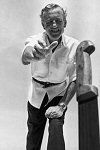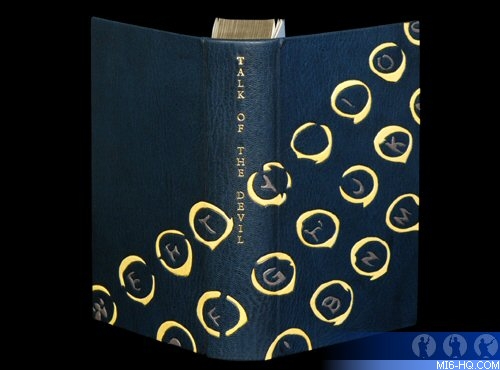 |
| |
MI6 takes a look at "Talk of the Devil", a collection
of rarely-seen journalism and other writing by Ian
Fleming...
|
|
Talk Of The Devil
21st January 2009
Talk of the Devil is a collection of rarely-seen
journalism and other writing by Ian Fleming. It belongs to a
special
edition of his complete works published in 2008 by Queen Anne
Press to commemorate the centenary
of his birth. The edition
is intended to celebrate Fleming not only as the creator of Bond
but as an accomplished and vivid journalist, distinguished bibliophile
and literary publisher. No uniform edition of Fleming’s
complete works has appeared before. Talk of the Devil, the last
of eighteen volumes, is edited by his niece Kate Grimond and
nephew Fergus Fleming.

Above: "Talk Of The Devil" Hardcover
|
Preface
“In preparing this volume our goal has not been to assemble
every overlooked scrap of Ian Fleming’s writing, far less
to make a definitive collection of his journalism. Instead we
have tried to create a book that does justice to its author.
The contents have been selected for their rarity, their historical
and biographical value and the glimpses they give of his opinions
and enthusiasms. Our overriding policy has been that they should
be of interest and entertainment.
A few items have never been published,
others have already appeared in print - as, for example, the
articles that Ian Fleming wrote
during his long association
with the Sunday Times. In the latter case we have followed the original typescript
rather than the published version, and where good lines were edited out we
have put them back in. The title is taken from a notebook in
which Fleming listed
names and phrases that caught his fancy. Talk of the Devil, which was an
early contender for Diamonds Are Forever, caught our fancy too.”
At more than 400 pages Talk of the Devil is the longest work
ever to bear Ian Fleming’s name. Its contents are divided
into six sections:
|
Among the unpublished items are two short
stories: A Poor Man Escapes, and The Shameful Dream.
The former is one of Fleming’s earliest
attempts at fiction, written in 1927 at the age of nineteen
while under the tutelage of Ernan Forbes-Dennis and Phyllis
Bottome in Kitzbuhel, Austria. It seems to have been influenced
by the reportage of Berlin-based author and journalist Joseph
Roth.
The latter was written in 1951 but never published for legal
reasons - one character bore too close a resemblance to Fleming’s
employer, Lord Kemsley. The “hero” is a journalist,
possibly based on Fleming himself. Intriguingly, he is called
Bone. A year and a letter-change later Fleming’s new
hero would be Bond.
|
|

|
Other notable entries pre-dating Bond include an eye-witness
account of the 1942 Dieppe Raid; Fleming’s “Memorandum
to Colonel Donovan” which laid down administrative practice
for the Office of Strategic Studies (O.S.S.), predecessor to
the C.I.A.; his contribution as Foreign Editor to the Kemsley
Manual of Journalism; and a lyrical description of Jamaica in
1947.
Taken together the contents but act almost as a glossary to
the Bond novels. Here, in embryo, are Dr. No’s island,
Goldfinger’s smuggling methods, Kerim Bey’s Istanbul,
Mr. Big’s Florida fish-tanks, the armament of Bond, the
octopus of Octopussy and more. There is even an early (if faintly
alarming) version of “shaken not stirred”, written
in 1956 for the American market:
“It is extremely difficult to get a good Martini anywhere
in England...The way to get one in any pub is to walk very calmly
and confidently up to the counter and, speaking very distinctly,
ask the man or girl behind it to put plenty of ice in the shaker
(they nearly all have a shaker), pour in six gins and one dry
vermouth (enunciate ‘dry’ carefully) and shake until
I tell them to stop.
You then point to a suitably large glass and ask them to pour the mixture in.
Your behaviour will create a certain amount of astonishment, not unmixed with
fear, but you will have achieved a very large and fairly good Martini.”
The volume traces Fleming’s delight in gambling, fast
cars, espionage and exotic climes. His fascination with buried
treasure is evident: one article, describing a hunt for pirate
gold in the Seychelles, rates almost as a short story. A rare
foray into politics, the 1959 “If I Were Prime Minister,” shows
him to have been a man of foresight and liberal tendencies who
supported a minimum wage, open immigration and freedom of information,
railed against bad diet, City bonuses and conspicuous expenditure,
and took a surprisingly modern approach to global warming. “The
petrol engine,” he wrote, “is obviously a noxious
and noisy machine and I would gradually abolish it and replace
it by some form of electric motor.” Fleming also pays tribute
to contemporary writers such as Graham Greene, Noel Coward and
Herb Caen, columnist supreme of the San Francisco Chronicle.
What comes across most strongly is his insistence on excitement.
Whether directly or indirectly, he rails against boredom. Title
after title contains the word “adventure.” In “Six
Questions,” 1961, he predicts the following:
|

|
|
“Life will become more comfortable and much duller
and basically uglier, though people will be healthier and
live longer. Boredom with and distaste for this kind of
broiler existence may attract an atomic disaster of one
sort or another, and then some of us will start again in
caves, and life on this planet will become an adventure
again.”
The volume concludes with an Envoi taken
from an interview in February 1964. “One can only be grateful to the talent that came
out of the air, and to one’s capacity for hard, concentrated
effort…. I don’t want yachts, race-horses or
a Rolls Royce. I want my family and my friends and good health
and to have a small treadmill with a temperature of 80 degrees
in the shade and in the sea to come to every year for two
months. And to be able to work there and look at the flowers
and fish, and somehow to give pleasure, whether innocent or
illicit, to people in their millions. Well you can’t
ask for more.”
|
Seven months later, on 12 August 1964, Ian Fleming died of a
heart attack.
Talk of the Devil is his final legacy.
For further information about the Centenary Edition please contact
- [email protected]
Thanks to Fergus Fleming.